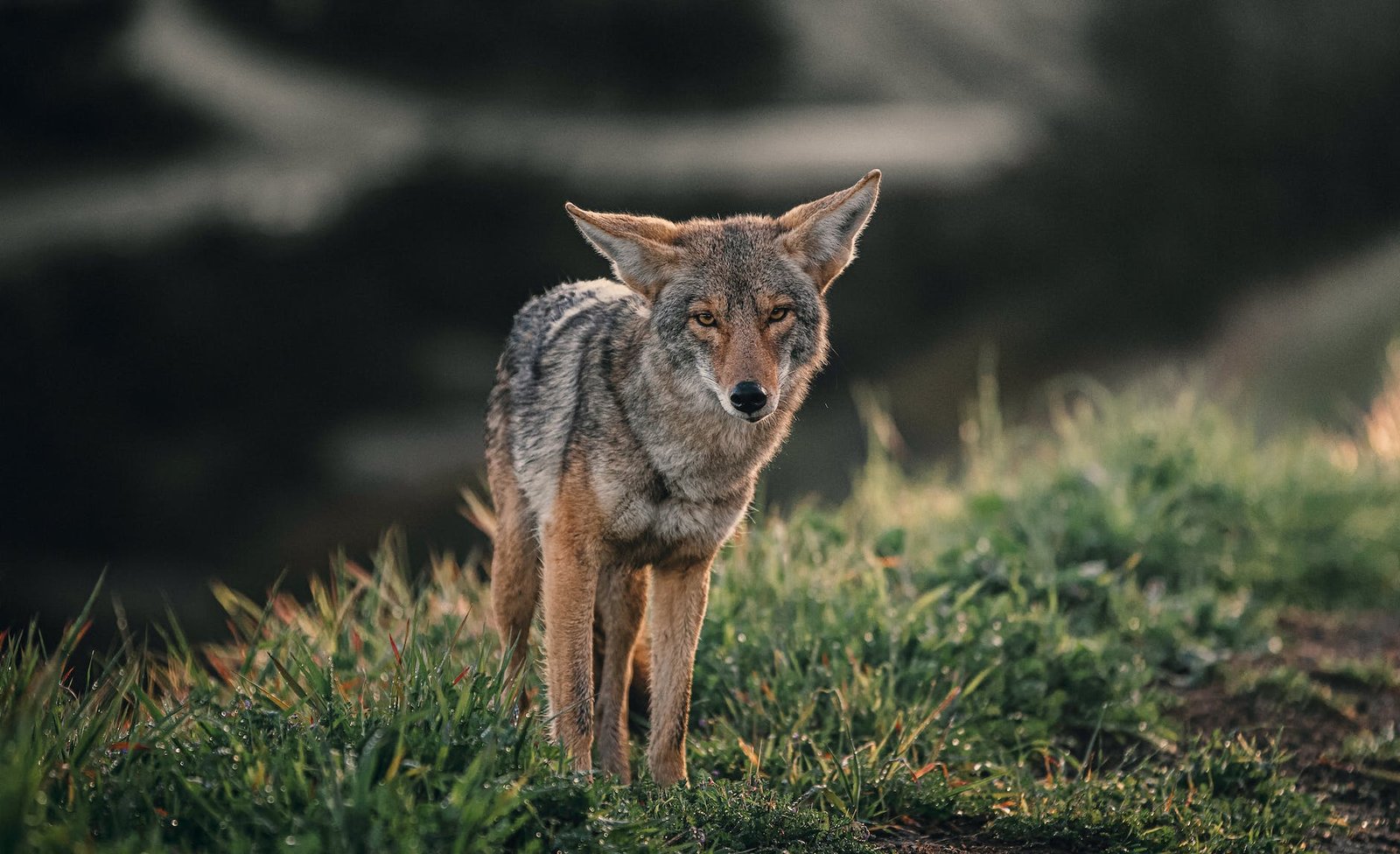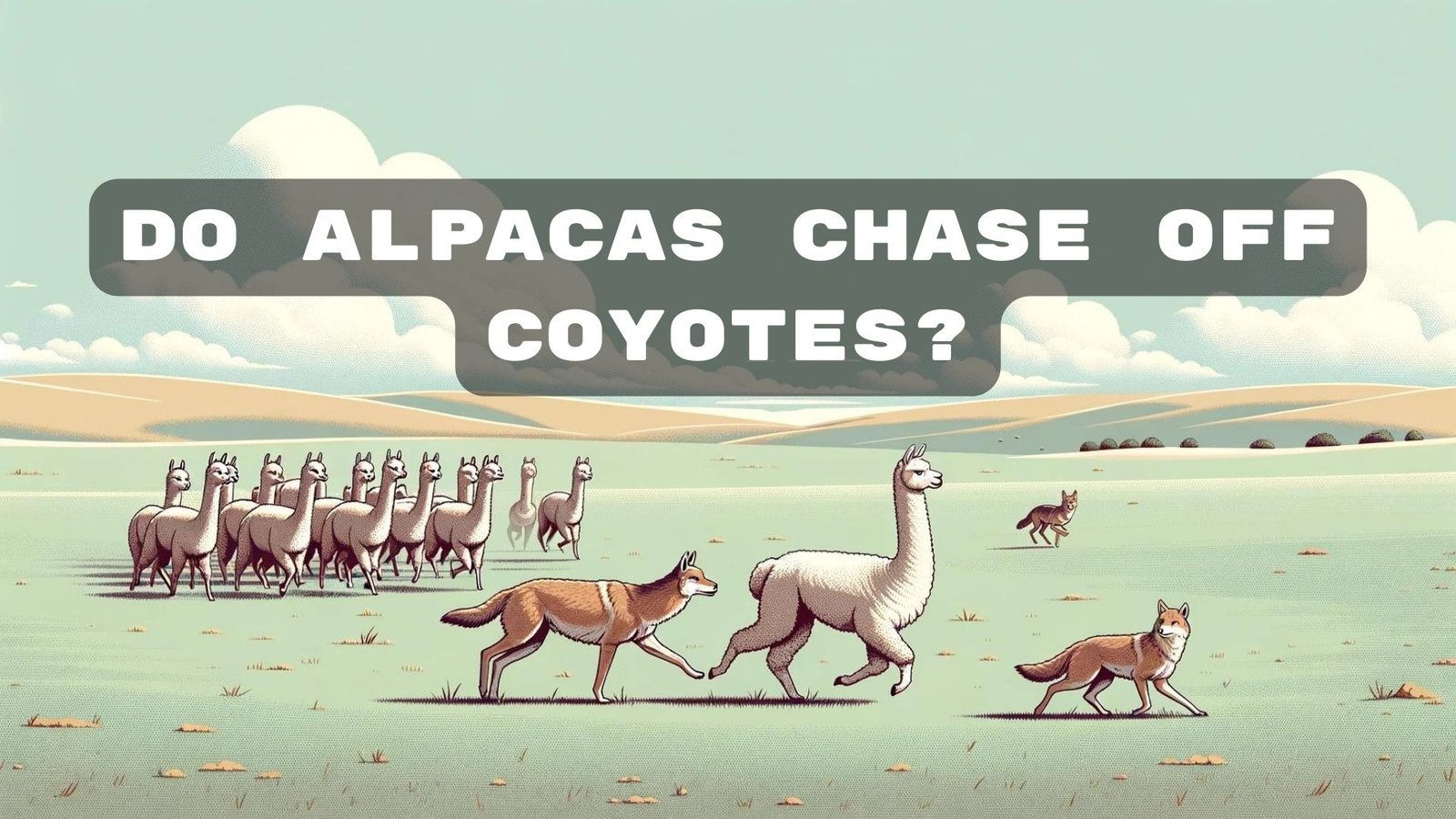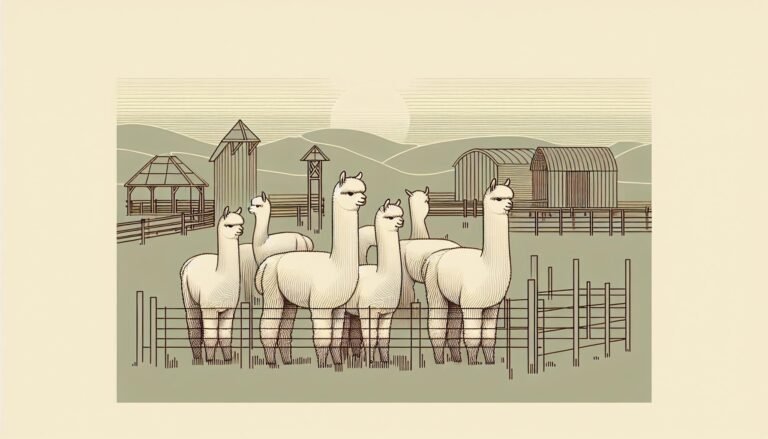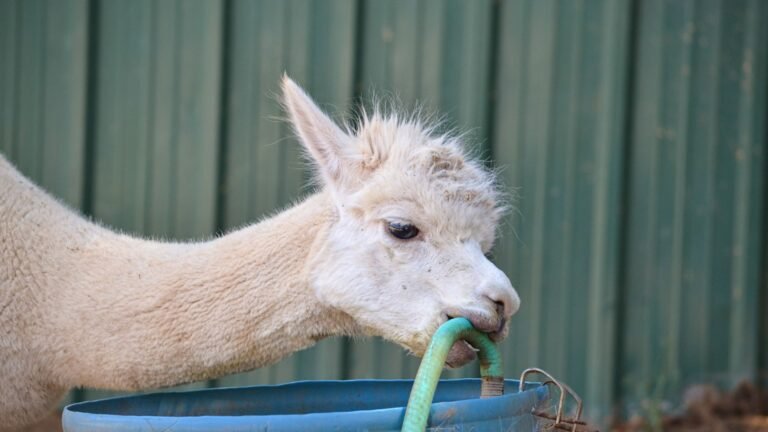Alpacas vs Coyotes: The Unexpected Natural Farm Protectors
Ever wondered if alpacas can play a role in your farm’s security system? You’re not alone. There’s a growing interest in using alpacas as a natural deterrent for predators, specifically coyotes. Do alpacas chase off coyotes?
It might seem odd at first, considering the calm and friendly nature of alpacas. But there’s more to these fluffy creatures than meets the eye. They’ve got a protective instinct that’s making them increasingly popular among farmers and ranchers.
So, let’s dive into the question that’s on everyone’s mind: Do alpacas really chase off coyotes? Stick around as we unravel this fascinating topic.
Key Takeaways
- Alpacas have a unique protective instinct that makes them a natural deterrent for predators, specifically coyotes.
- Alpacas use intimidation rather than outright attacks to fend off predators. They display defensive measures such as charging, kicking, or spitting at intruders.
- It’s fascinating that many farmers have observed reduced predator attacks after introducing alpacas into their herds.
- While alpacas can scare away many potential threats, they shouldn’t be the sole source of farm security. A comprehensive system including other guardian animals and advanced fencing is recommended.
- Alpacas have an innate protective nature and their keen senses of sight and hearing allow them to detect disturbances swiftly acting as a primary warning system.
- Not only do alpacas serve as guards, but they can also be profitable due to the high demand for their wool in the textile industry. They offer farmers a unique combination of protection and income.
How alpacas can serve as a farm security system
As we dig deeper into the behavior of alpacas, it’s fascinating to see how these docile creatures can offer a sense of security on our farms. Remarkably, alpacas serve as a natural farm security system due to their unique protective instincts.
Alpacas belong to the camelid family, which is inherently protective. One notable characteristic of alpacas is their keen sense of sight and hearing. With their long necks and elevated heads, they readily spot predators and sound an alarm. It’s a high-pitched noise, quite distinctive – an effective warning sign for other farm residents.
When coyotes or other predators venture too close, alpacas display a defensive stance. They might charge, kick out, or spit at the intruder. They put themselves between the predator and the rest of the livestock, acting as a buffer. Even though it’s hard to picture our charming alpacas in such a defensive mode, their actions can deter predators effectively.
Now don’t think that alpacas are going to physically tussle with a coyote. It’s not their style. This behavioral strategy adopted by alpacas is about intimidation and deterrence, rather than an outright attack.

It’s interesting to see that many farmers and ranchers are now integrating alpacas into their livestock – not just for their wool but also for their protective instincts. Farmers have noted reduced predator attacks after introducing alpacas into their herd.
But remember, while alpacas can deter many would-be predators, placing the entire burden of herd security on them isn’t recommended. If the predator is determined or in a pack, an alpaca might not effectively ward off the threat. It’s always best to have a comprehensive farm security system in place.
Looking further, this leads us to explore other forms of farm protection and how alpacas fit into such a dynamic system, playing their part effectively. This takes us into a whole new area of study – farm security measures and the role that our beloved alpacas play.
The protective instinct of alpacas
When it comes to the question, do alpacas chase off coyotes, the answer lies primarily in their innate protective instincts. They’re naturally alert animals, displaying protective behaviors that often deter not just coyotes, but also other predators. Their keen senses of sight and hearing allow them to spot potential risks and react accordingly, often acting as the first line of defense for farm animals.
It’s quite impressive how alpacas use their physical attributes to safeguard themselves and their herds. They assume a defensive stance, positioning themselves between the predator and the rest of the livestock. In my experience, I’ve seen alpacas stamp and spit at danger, every move carefully calculated and targeted, displaying the sheer protective instinct of these creatures.

Documented evidence shows alpacas sound an alarm, a distinctive, high-pitched noise, whenever they sense a threat. It’s this call that alerts the rest of the herd and even the farm owners of potential danger.
One thing to bear in mind, though, is that despite their protective instincts, relying solely on alpacas for farm security may not be the best strategy. They’re not infallible. Yes, numerous farmers have reported a significant reduction in predator attacks after introducing alpacas into their livestock. Yet, it’s prudent not to put all your eggs in one basket. A comprehensive farm security system is recommended for ensuring maximum protection of your livestock. And, it’s not just about alpacas. Consider other forms of farm protection to help create a multi-layered and robust farm security setup.
In the next section, we’ll look deeper into why these protective instincts may not always work. We’ll also explore some real-life experiences of farmers in dealing with coyotes and other farm predators. Having a good understanding of this will ensure you’re well-equipped to establish an effective farm security system.
Understanding the threat: Coyotes
It’s essential to fathom the complexity of the danger that coyotes pose to farm livestock. These intelligent and adaptable predators are known for their opportunistic hunting habits. Due to their keen sense of smell and hearing, they’re seen as a constant threat to your herd’s safety.
Coyotes have a territorial instinct. They tend to mark their territory and usually hunt alone or in pairs. They’re also adaptable and manage to thrive in both urban and rural settings.
Their primary diet consists of small mammals but coyotes won’t hesitate to attack larger livestock if the opportunity presents itself.
Farmers have often recounted incidents of coyotes cleverly breaching traditional electric fences. They can dig under or leap over many barriers put up for protection. There’s more to this than just instinct as science has shown that coyotes have an evolved hunting strategy. They assess the danger, calculate risk, and seize the opportunity when it’s presented.

Within the context of alpacas serving as a protection shield for the herd, it’s also crucial to study how coyotes interact with these animals. Research has shown that alpacas, with their size and defensive stance, can intimidate coyotes. Instances of alpacas chasing coyotes off have been reported, demonstrating the natural deterrent that alpacas offer. However, it’s important not to solely rely on them to fend off such adaptable and cunning predators.
The proactive approach towards farm security should be multipronged encompassing fencing, guardian animals like alpacas and dogs, and constant vigilance. Adopting only one method of protection could leave you vulnerable to gaps in your security system.
Analyzing coyote behavior and their interaction with alpacas forms an essential part of comprehending the broader picture concerning farm security. It aids in the formation of a more robust, holistic security strategy. The more we learn about these inter-species interactions, the better equipped we are to prevent potential attacks.
Do alpacas chase off coyotes?
Yes, alpacas can indeed chase off coyotes. They’re naturally protective animals, renowned for their bold temperament in face of threats. When coyotes approach, alpacas may create a raucous alarm call, drawing attention to the intruder. But they don’t stop there. Often, they’ll physically challenge these predators, kicking and running at them in a clear display of fearlessness.
However, this doesn’t mean you can solely rely on alpacas for your coyote problem. As many experienced farmers and ranchers will tell you, a multipronged approach is required for effective farm security. Pairing alpacas with other deterrent methods like noise-making devices and sensor-based lighting systems can significantly improve your coyote control strategy.

One popular secondary method is using specially trained guardian dogs. Breeds such as the Great Pyrenees, Akbash or Anatolian Shepherd are known for their bravery and intuition in such predicaments. When teamed with alpacas, they work impressively well to deter coyotes.
Another key element to consider is your fencing. As I mentioned earlier in our discussion, coyotes are intelligent and adaptable predators. They can breach traditional fences using their strong legs and agile bodies. Opting for predator-proof fencing can bolster your defenses considerably.
Here’s a handy summary in a markdown table:
| Method | Effectiveness |
|---|---|
| Alpacas Alone | Medium |
| Alpacas + Dogs | High |
| Alpacas + Fencing | Very High |
Thus, “do alpacas chase off coyotes?” – Yes, but it’s far more effective when they’re part of a well-rounded, holistic farm security strategy.
So, it’s essential not to overlook the importance of continuous vigilance and implementing supplementary protective measures. We’ve had a deep-dive into understanding coyote behavior and its interaction with alpacas in our holistic strategy. Moving forward, we’ll delve even deeper into this subject matter. Getting to the bottom of how effective protectors like alpacas determine when their herd is threatened and when action is necessary.
Benefits of using alpacas as a natural deterrent
In the constant struggle to keep coyotes at bay, many farmers are turning to a rather surprising solution – alpacas. These fluffy animals, known predominantly for their high-quality wool, bring a unique blend of benefits that make them an effective natural deterrent to coyotes.
Alpacas possess an innate protective nature. When danger presents itself, instead of running, they typically run towards the threat. This bold stance can often surprise and deter potential predators like coyotes. Their size and strength can also play a factor in scaring away these unwelcome visitors. Not something you’d associate with such gentle-seeming creatures, right?
In addition to their protective demeanors, alpacas can provide farmers with another significant advantage – their keen senses. Alpacas have a remarkable ability to detect disturbances in their environment. Their keen eyesight, even in the dark, along with their sharp hearing, allow them to spot predators from a distance. This early detection alerts the rest of the herd and even the farmers, acting as a sort of early warning system.
Also worth noting is the low maintenance nature of alpacas. Unlike traditional guard animals, such as dogs, alpacas rarely require extra food or attention. They live comfortably alongside the livestock they protect, and they are generally healthy and resilient creatures. Therefore, aside from shearing their wool, alpacas don’t add much to the farmer’s workload.
Finally, on the economic front, alpacas can be a boon, too. They not only serve as guards but also can be profitable in their own right. Their fine wool – highly sought after in the textile industry – makes them a two-in-one investment for farmers.
So, it’s not just about protection. With alpacas, you get a guard and a source of income bundled up in a single package. More farmers should consider these multi-tasking marvels to beef up security and add a bit more profit to their operations. Using alpacas for farm protection can be risky if relied upon alone, but it’s a component of a solid, multi-pronged attack against coyote intrusions.








One Comment
Our picks
Alpaca & Wool Felted Sole Inserts: Comfy Upgrade?
Best Alpaca Socks for Hiking: Ultimate Comfort and Durability on Trails
Best Alpaca Halter for Comfort and Control